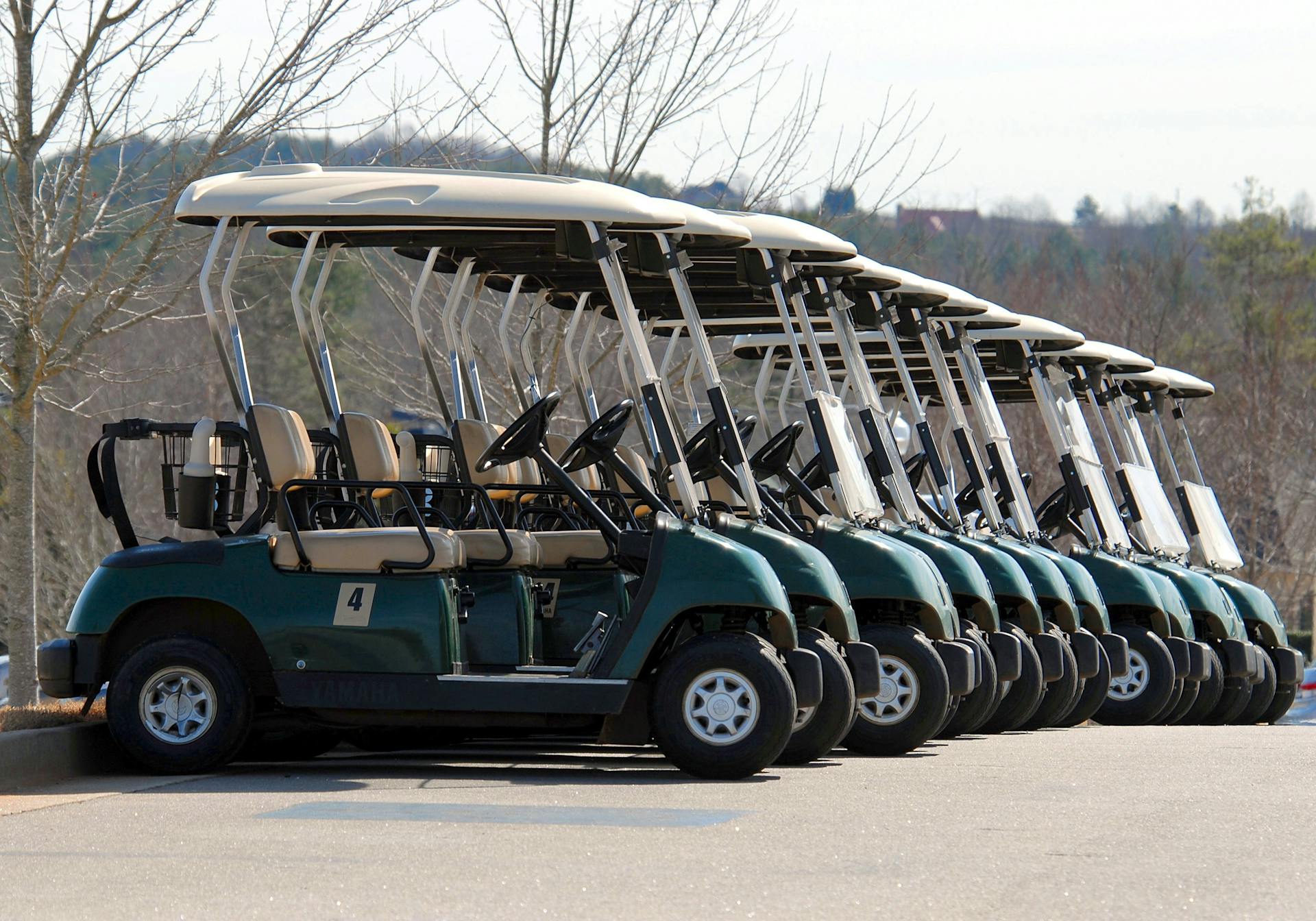
What makes golf cart street legal? While it is true that golf carts were designed to drive on golf courses, not city streets or highways, there are occasions where it would be convenient to operate a golf cart on the street. If you live in a rural community where speeds are low, distances are short, and terrain is flat, you may be able to make your golf cart street legal.
To start with, you need to determine whether it is legal to operate your golf cart on the street. You should check the laws of your state and local municipality to find out their specifications for registering a vehicle for street use. Generally, states allow low-powered vehicles like electric scooters and mopeds to have access to roadways, so look up whether your state allows for golf carts as well.
Once you have checked your local regulations, you need to make sure that your golf cart has all the necessary components installed in order for it to be considered roadworthy. At the very least, this would include safety equipment like headlights, taillights and brakes as well as blinkers/turn signals. Additionally, depending on where you live, your vehicle may require things like windshields, side-view mirrors or license plates in order to pass inspection.
After these steps are taken care of and everything is in working condition, the next step is usually registering the vehicle with the local government so that it is properly documented. This can involve obtaining insurance and other documents depending on the state regulations but once all requirements have been met then your vehicle should be ready for road use!
With this guide in mind and some time and effort invested into making modifications and submitting applications by filling important paperwork online or at DMV offices; anyone ought to be able successfully convert their own Golf Cart into a Street legal Vehicle permitting them easier access into towns and cities while arguably increasing safety when travelling short distances.
Expand your knowledge: State Illinois
What modifications can be made to a golf cart to make it street legal?
The idea of converting a golf cart into a street-legal vehicle is gaining popularity due to itsfuel-efficiency and convenience. If a person wants to make their golf cart street legal, they must make several modifications to meet local and state regulations.
The first step to making a golf cart street legal is to install the necessary safety features such as lights, reflectors, horn, seat belts and mirrors. All of these safety features must meet applicable regulations and be in good working order.
Next, the cart should be equipped with a two speed throttle controller containing reverse capabilities and an additional brake system. This will ensure that the vehicle operates safely due to adjusted speeds for both accelerating and stopping.
On top of installing these basic safety systems, several other factors must be met in order for the cart or buggy to be street legal. It must pass annual inspections from local law enforcement or DMV personnel before it can legally operate on roads within your municipality or state. In some states, carts on roads exceeding 35 miles per hour require additional mirror reflectors and signal lights to further increase safety on roads traveling at those speeds or higher.
With modification made according to the local laws, vehicles previously used strictly for leisure activities can now efficiently travel on roads while meeting all necessary safety requirements - making them both fuel efficient and legal!
What features must be installed on a golf cart to make it roadworthy?
A roadworthy golf cart is a vehicle that is street legal, meaning it must meet certain requirements specified by the local highway laws. A golf cart that is up to specification must contain several features, both mechanically and in terms of the graphics and design. Primarily, golf carts must have a rearview mirror, headlights (including turn signals and brake lights), windshield wipers, seatbelts for all passengers, a parking brake system, and side mirrors. Additionally, many jurisdictions will require a rear license plate mount and horn.
When it comes to mechanical components for roadworthiness, brakes are the most important feature. The brakes must be strong enough to bring the golf cart to a stop from its maximum speed or within 20 feet when driving at 20 MPH. The electrical system must also be able to start the engine reliably by cranking or through an electric starter. The battery must also be able to power all the electrical components including lights and accessories when driving at night. Furthermore, the frame of the vehicle should meet certain standards and provide safe handling behaviors on roads with tight turns or sudden changes in grade.
The right visual elements are needed to make your golf cart street ready as well. Graphics need to be reflective so they can be seen at night without distracting oncoming drivers. Additionally, decals need to follow safety regulations in terms of size and placement so they do not block visibility or impede maneuverability while driving. Assembling these features may seem daunting at first but with proper guidance from your local DMV office, you can become an expert in determining what it takes for your golf cart to become street ready!
Suggestion: How to Become a Golf Course Architect?
What type of vehicle registration is required for a street legal golf cart?
Street legal golf carts require specific vehicle registration to be legal on public roads. For most states, golf carts must adhere to local laws and guidelines from the Department of Motor Vehicles (DMV) in order for them to be registered as street-legal vehicles. Depending on where you live, registration may be required for a golf cart that you intend to operate on public roads or highways.
In order to register a golf cart as a street-legal vehicle, the owner must first present a DMV-approved safety inspection proving that the cart meets all safety standards and other requirements set out by the state. Commonly required information includes proof of ownership, like a title or registration if not already issued by the DMV, insurance policy numbers and proof of payment, and valid driver's license information. The owner might also need to submit additional documentation proving that the cart has been modified according to their state’s requirements—this generally includes specific lighting, turn signals, brakes, seat belts, windows/windshields and horn systems in order for it to be considered street legal.
The process for registering a golf cart as street-legal will depend on the laws of your individual state and should not be undertaken without first seeking proper counsel from DMV personnel who can best provide details regarding specific regulations. If you're uncertain of your home state's laws regarding golf cart registration as they pertain to off-road vehicles, it is important that you seek assistance from people who are familiar with all local guidelines before moving forward with your project.
Curious to learn more? Check out: How to Train a Husky to Not Run Away?
Is a special permit required to drive a modified golf cart on public roads?
The answer to the question of whether a special permit is required to operate a modified golf cart on public roads depends largely on the type of modifications made, as well as the laws of your particular state. Generally speaking, most states require some kind of additional certification, such as a DMV-issued golf cart driver's license and valid registration, for any type of motor vehicle operated on public roads.
Each state's individual laws pertaining to such regulations are specific to the type and amount of modification that has been done to the golf cart. For instance, many states restrict special permit drivers from operating modified carts on public roads if certain aspects have been changed, including making modifications to acceleration speed and carrying a load larger than what is considered "normal" in terms of both size and weight. If a driver needs a special permit (which may vary from state-to-state) due to these or similar modifications, then they must typically complete all pertinent nationwide or local requirements prior to being legally authorized for road use.
Overall, for those who want to drive a modified golf cart on public roads and highways, it is important to be informed about your particular region's laws before attempting do so. This includes familiarizing yourself with not only specialized permits required by your state but also with applicable federal guidelines, insurance requirements and other related traffic regulations that could possibly apply during operation.
Are there certain safety requirements that must be met in order to make a golf cart street legal?
Golf carts are becoming increasingly popular as an economical choice for drivers looking to make short trips or commute to and from places of work or study. As their popularity grows, people are beginning to wonder if their golf carts can be made street legal. The answer is a resounding: Yes! However, there are certain safety requirements that must be met in order for a golf cart to be street legal.
First and foremost, the golf cart being modified must adhere to all state and local laws regarding street legal vehicles. Requirements vary from jurisdiction to jurisdiction but some common mandates include: having lights (headlights, taillights, brake lights, turn signals), license plates, windshields and seatbelts. Generally speaking most states also require some types of mechanical modifications such as adding a horn, using high quality tires and brakes that meet certain standards. There may also be restrictions on the top speed of the golf cart; usually around 25 mph or less depending on the jurisdiction.
Aside from state regulations, owners will want to ensure their golf carts meet industry standards for safety or they could face potential liability claims should an accident occur. These safety measures include having at least two mirrors installed on either side of the vehicle as well as engaging in regular maintenance checks such as inspection of all moving parts (axles wheels) and checking fluids on a regular basis. Additionally other items such as safeguarding the electrical system against rolling back up hills and failed brakes can help minimize potential injury or death while driving your golf cart legally on public streets.
With a little extra effort and research into local laws, any owner can make sure that their golf cart is street legal so that it can pass safety inspections at any time and anywhere it needs to travel.
Is a police inspection necessary to make a golf cart street legal in certain states?
A police inspection may be required to make a golf cart street legal in certain states due to traffic laws, emissions standards and other safety regulations. This can vary greatly depending on your state’s regulations, so it’s important to speak with local authorities before making any upgrades or modifications to your cart.
In some states, golf carts are specifically banned from public roads without a valid permit. Therefore, local police officers will inspect your cart and must be satisfied that your vehicle meets all applicable safety regulations. These inspections may include checking the size and type of tires as well as ensuring that headlights, brake lights and turn signals are functioning properly. Depending on which state you live in, drivers may also need to pass an emissions test before getting approval for street legality status.
Additionally, golf carts used for off-road purposes will likely require different modifications than those for street use. This could include adding seat belts or a roll cage if the original design does not meet minimum safety requirements. In any case, it’s essential for drivers to understand their local laws prior to making substantial changes or modifications to their vehicle. Consulting with local police is always a wise choice when attempting to make a golf cart street legal in most states.
Featured Images: pexels.com


